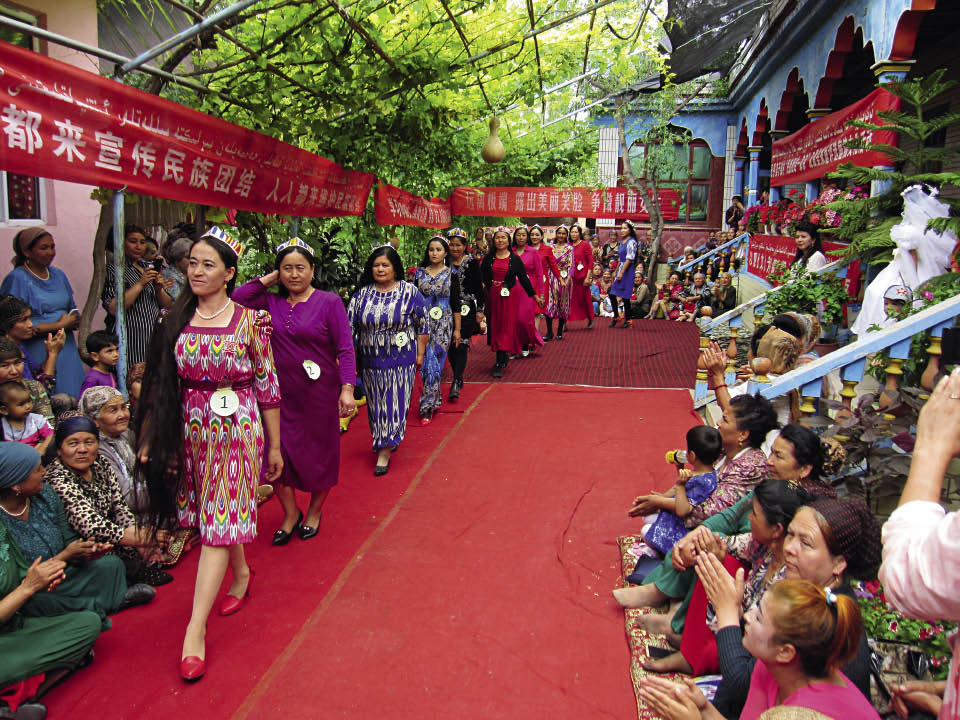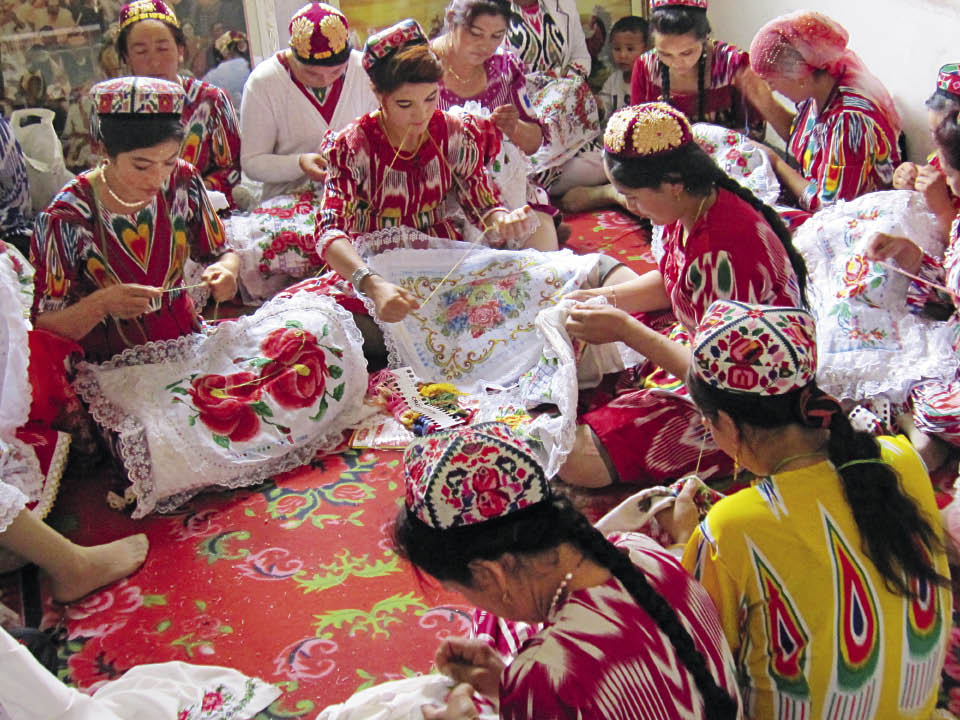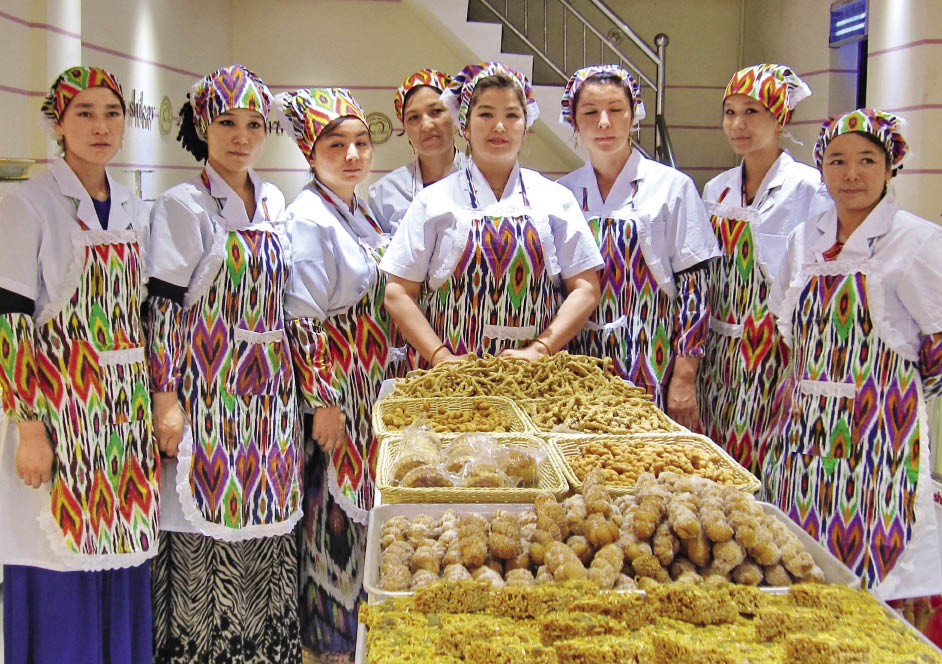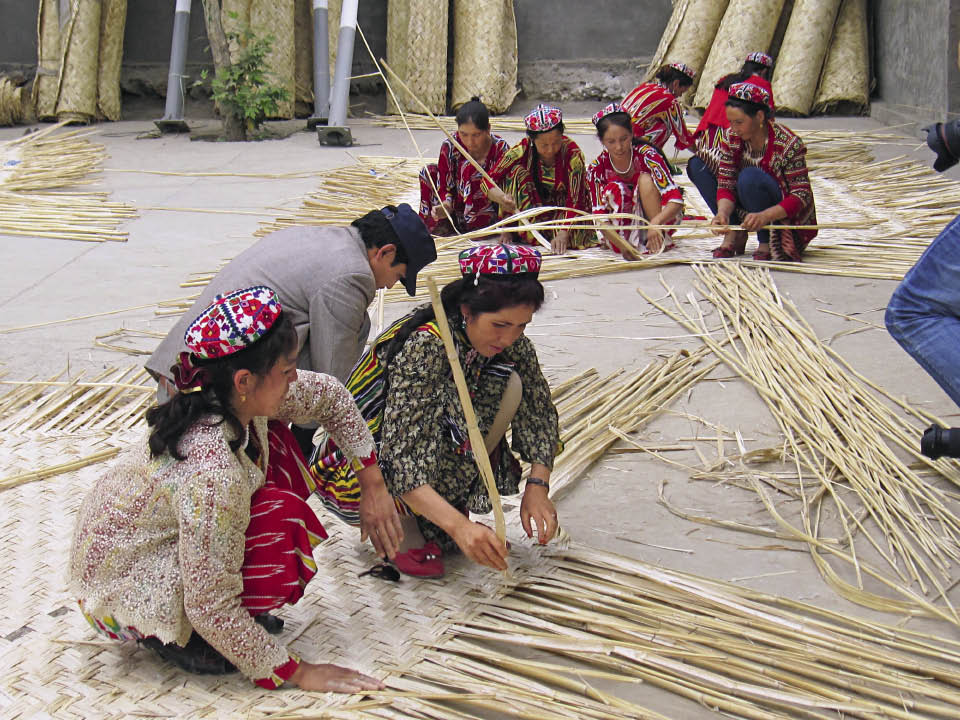By staff reporter JIAO FENG
By staff reporter JIAO FENG
XINJIANG Uygur Autonomous Region is one of China’s five ethnic minority autonomous regions. With the largest land mass among all provincial administrative divisions, it is home to 47 ethnic groups. Women account for nearly half – 49.3 percent – of the total population (23.6 million), but are still deemed subordinate to men. This is due to the region’s less-developed economy, comparative exclusiveness, and the strong grip of old traditions. In general, women receive less education, and are mostly homemakers and caregivers for elderly parents and children. The traditional belief is still held strong that the domain of women is the home, while men attend to all other matters and earn the income.

People of Tuohuqiyuzi Village in IIi Kazak Autonomous Prefecture gather for a beauty pageant.
The role of women in building a strong family and society has been increasingly recognized worldwide. To encourage local women to venture out of their homes and give greater value to society, governments at all levels in Xinjiang have rolled out various policies and incentives to assist them in seeking employment or starting their own businesses. The goal is to help their transition to the role of modern women by fostering their independence, self-esteem, and confidence.
People of Tuohuqiyuzi Village in Ili Kazak Autonomous Prefecture gather for a beauty pageant.
“I Can Make It”
Yao Qinzhang, 44, is general manager of a chain drug store in Urumqi, capital of Xinjiang. Sixteen years ago she was unemployed with no specific skills.
Yao was formerly a tally clerk at a supermarket, but lost her job during an internal overhaul of the company in 2000 when she was 28. In the following year, she attended a computer skills course offered by her community, which inspired her to open her own business. With the support of community workers, she applied for a RMB 80,000 micro-loan from the government tailor-made for laid-off workers. After supplementing it with her RMB 50,000 savings, she rented a 50-sq-m storefront in which to set up a drugstore.
To control costs, Yao operated the store on her own: stocking, tallying, and selling. To save on transport costs, she took the bus twice a week to buy her stock, usually weighing dozens of kilos, and had to make several transfers per trip. Meanwhile, she enrolled in a pharmacology correspondence course at Xinjiang Medical University and another on corporate management at Xinjiang University of Finance and Economics. She eventually received dual junior college diplomas. What’s more, her pharmacy license was approved in 2004.
Her store gradually established a reputation among local residents, and the business steadily expanded from one store in 2001 to 12 by 2014. Yao combined them into a limited company called Minjian. Her transformation from a housewife to a corporate executive has boosted Yao’s confidence. “I was depressed while unemployed, seeing no hope in life and filled with bitterness. The community workers empowered me,” she recalled.

Yao Qinzhang’s drugstore chain employs 72 people, most of whom are former laid-off female workers and housewives.
Yao now employs 72 people, most of whom are laid-off female workers or wives of workers at neighboring companies. “It is not that they lack capability or are not willing to change their fate and create a better life, they just need a chance to do so,” Yao said. “I hope more women realize their values to the fullest, either at home or in workplace, as I did. Anyone who contributes to society will find a place in it. They can definitely achieve what I have accomplished.”
This type of self-confidence and self-awareness is just what the regional government is trying to instill in local women through its “One Million Women Training Plan,” under which more than 8,000 training sessions have been provided to 837,000 women in the past five years. Its aim is to foster the “I can make it” attitude among women of all ethnic groups in the region, so emboldening them to carve out a more fruitful life.
“You can call me Bubu. I love this name,” Nurbubu Almakun, a young Uygur woman, told the reporter in fluent Mandarin Chinese in our first meeting. The daughter of a farmer in Qapqal Xibe Autonomous County in northwestern Xinjiang, Bubu dropped out of high school and moved to Urumqi, where she became a waitress. “In my first days here, I did not speak or write Chinese, so I could barely communicate with Han customers. However, I was hardworking and ready to learn, so I was soon spotted by my boss.” Bubu was sent to study modern hotel service and management in big inland cities. By 2010, she had become a senior manager of her restaurant, and received 10 percent of its shares as a bonus.
While building a successful career, Bubu married a Han chef working at the same restaurant, and they later had a son and a daughter. They now live with her parents-in-law. Despite having different ethnic backgrounds and customs, members of this big family love and respect each other and live in harmony.
“Only financially independent women can achieve equality and a better life,” Bubu told the reporter. “I would like to influence other women with my experiences, inspiring them to be independent and aspiring, and believe that ‘I can make it’.”
Bubu and Yao Qinzhang are just two of the increasing number of Xinjiang women who are leaving the confines of their homes and entering broader society. Through this, they espouse new ideas and experience.
During the 12th Five-Year Plan period (2011-2015), 2.44 million urban residents were newly employed, 1.27 million among them women. In the countryside, 13.26 million people found jobs outside of farming, 5.57 million of them women.

Yimamu, 26, was promoted to the post of manager within one year of working at the factory in Kashi Prefecture of a Shenzhen-based garment company.
There are still 2.61 million poverty-stricken households in Xinjiang, in which 1.19 million women live. They are mainly in rural areas, particularly southern Xinjiang. Many women stop work once they are married, which exacerbates the financial plight of many families.
Changes are now underway, according to Hou Hanmin, Party secretary and vice chairperson of the regional Women’s Federation. Local governments at all levels are promoting the image of the modern woman, who is strong, with high self-esteem and self-confidence, and independent. The government encourages local women to find employment close to their homes so that they can balance work and family. “This year the regional government plans to give RMB 79 million to 400 small and micro businesses founded by women in southern Xinjiang. “In doing so, more jobs will be created in these regions. We hope women will become more socially involved and develop broader visions and minds. We are confident in this regard,” Hou said.
Charm Project
When I arrived in Tuohuqiyuzi Village in Ili Kazak Autonomous Prefecture, residents of the whole community, over 100 people, gathered in the grapevine-shaded yard of Nureman Karsen for a beauty pageant. The models, aged from under 20 to over 50, were clad in Atlas silk, the signature Uygur textile, and wore the traditional four-cornered hat over their elaborately braided hair. Children also took the stage, and stole the show from time to time with their spontaneous performance, drawing thunderous applause and laughter from the audience. The event reached its climax when all villagers stood up for the Maxrap folk dance.
In Xinjiang, the yard is a key venue for family and community activities. A vegetable plot, small orchard, and a grapevine trellis constitute fundamental yard features in all rural homes. It has been a trend in Ili over recent years to stage cultural activities in the yard to enhance community cohesion.

A rural community in Yengisar County runs embroidery courses for local unemployed women.
In 2011, the regional government of Xinjiang launched the Charm Project, one of a total of 22 key programs concerning peoples’ livelihood. Its mission is to foster brands and industries with local features in the fields of cosmetics, garments, and health care.
Xinjiang women have long been admired for their craft skills. The clothes, home decorations, and bedding they design and sew are daily-life necessities, but also works of art sought after by people around the world, so bringing them an extra source of income.
Jamal Mirzamamat, a young Tajik woman, is a beneficiary of the Charm Project. Upon graduating from the English school of Xinjiang Institute of Light Industry Technology in 2008, she became a teacher in her hometown. One day, a tourist, fascinated by the folk hat she wore, asked where he could buy one. “According to our tradition, all clothing items are homemade. So we never buy them from others, and there is no market demand for them. Upon learning this, the tourist offered to buy the one I was wearing,” Jamal said. This incident inspired her. Upon returning home, she told her father that she intended to open a business selling traditional Tajik handicrafts, and immediately won his support. In March 2009, she registered a company, the first one in the locality to manufacture and market Tajik-style products.

Aishan (center) opened a bakery store with a government micro loan. She offers free training for women who are interested in this business.
To obtain financing, Jamal applied for and received small government loans. She stocked her store with embroidered hats, clothes, bags and pillow covers bought in rural communities. Later, she decided to set up her own workshop to produce these items, but could not find workers, as few believed that this venture by a new graduate had any chance of success. Eventually, three other young women joined her, without telling their families.
The stroke of fate came when Jamal participated in a start-up plan competition sponsored by the regional government for college graduates in 2010. After her story was covered by the media, job applications to her company increased. So far, she has a staff of more than 40, and her clientele has expanded from Beijing and Shanghai to other countries and regions, including Pakistan and Tajikistan. In May, she sealed another order of RMB 1 million with a company in Shenzhen.
Under the Charm Project Xinjiang women are empowered not only to celebrate their physical beauty, but also bring into play their intelligence and create a more fulfilling life.
Half of the Sky
The multitude of successful women I interviewed during the journey across Xinjiang epitomize women’s development in the region since the founding of the autonomous region 61 years ago.
Gender equality is one of China’s basic national policies. Xinjiang was among the first to endorse the Law of the People’s Republic of China on the Protection of Rights and Interests of Women. It has moreover formulated and adopted two Outlines for Women’s Development, which touch on all aspects of women’s work and life, backing gender equality in all regards, including politics, economy, culture, and education. These endeavors contribute to the cultivation of woman leaders and women’s participation in politics.
Gulnarhan Kurban is a village head in Yengisar County of Kashi Prefecture. Her community of 1,240 people was long plagued by poverty due to insufficient farmland – 0.1 hectare per person. After being elected Party secretary of the village in 2013, Kurban took the issue of poverty reduction head on.
After an extensive study of local conditions, she proposed a shift to fruit production. “We have the right soil and climate for growing fruit, and most villagers have certain experience in this aspect. Besides, the market for fruits is good, so we can soon see the benefits,” Gulnarhan explained. Under her advocacy, the village planted apricot trees on two thirds of its lands. It is predicted that this year’s harvest will bring in at least RMB 6,800 of per capita income.
“How do the guys feel about a woman in command of the village?” I posed this question to Gulnarhan.
After thinking for a moment, she replied, “The old notion is changing that home is the woman’s domain and any affairs beyond should be left to men. As long as a person is fair, unselfish, and ready to serve the people, the villagers are willing to accept him or her as their leader.”
The regional government lays great store on the selection and promotion of female officials, and offers multiple opportunities for their growth. As a result, the number of female officials keeps rising, and women’s participation in local governance is expanding.

Employment gives women more exposure to the broader society, boosts their incomes and improves their livelihood.
One of them is Mehriay Abdukadir, vice chairperson of the Ili Women’s Federation. Starting her career as an agricultural technician, she worked at several jobs, including village head, township magistrate, and deputy county governor, before taking the current position. She attested from her personal experience that the regional government pays close attention to the cultivation of female officials, in particular those of ethnic minority groups. “I was the first female chief of a township and then of a town in Yining City. Now overseeing women’s programs, I am glad to set an example for other women, influencing them and leading them to higher self-esteem, self-confidence and ambitions. They may then stand on equal footing with men.”
According to Hou Hanmin, a remarkable change among Xinjiang women in past years is the stronger self-awareness among them and their broader presence in social, economic and cultural undertakings. “A different gender perspective is needed for better policy-making and governance. The regional government of Xinjiang attaches great importance to women’s participation in politics. A mechanism has been put in place for deputies to the local people’s congress and members of local committees of the Chinese People’s Political Consultative Conference to solicit advice and opinions of different groups, including women, as regards legislation and consultation. Every sector has a woman representative in the government or policy-making process. This allows women to play their due role of ‘bolstering half of the sky,’ and signifies significant social progress,” Hou remarked.
The number of female officials has soared to its present 419,000 from a mere 7,700 at the birth of the autonomous region. Two thirds of them are members of ethnic minority groups, and account for 51.7 percent of all local officials. The presence and clout of women in the policy-making process and institutions is an essential measurement of women’s social standing.
“Women have tremendous power. Only when bringing this power into full play can we advance human society and civilization towards a better state,” Hou concluded.